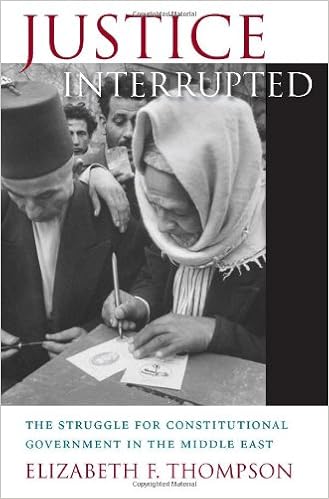
A major work by an eminent scholar of the Middle East, Justice Interrupted provides a panoramic view of the region's struggle for justice and constitutional government over the past century and a half. Thompson offers powerful evidence that the pro-democratic aspirations of the Arab Spring have long roots. . Rejecting superficial cultural stereotypes, Thompson articulates the importance of the common citizen and the social activist struggling for a more just society during a time of wrenching change. Thompson boldly tackles some of the thorniest issues in the making of the modern Middle East--constitutionalism, freedom, democracy, visions of justice from across the political spectrum--and lucidly demonstrates how they have been experienced and contested by a broad range of social actors. An urgent and accessible history of 'ideas in action,' Justice Interrupted is essential reading for anyone interested in the past, present, and possible futures of the entire region.
In this book Thompson sees the thirst for justice and reform blossoming as long as 400 years ago, when the region was in the hands of the Ottoman Empire. In the generations since, bureaucrats, intellectuals, workers, and peasants have seized on the language of empire, law, and even Islam to agitate for rights and due process...Most intriguing, she finds elements of this constitutional liberalism even within fundamentalist Islamist movements that democratizers most worry about. These threads suggest a possible way forward, a way to build a constitutional, democratic consensus on indigenous if often overlooked traditions. Islamists and secular Arabs, it turns out, have found common ground in the past, even written constitutions together. The same could happen again now...It's easy to assume that religiously driven movements are all antidemocratic--and indeed, some have proven so in practice, like the ayatollahs in Iran or the Muslim Brotherhood in Egypt. But Thompson offers a more nuanced view, showing that many of these religious movements have internalized central elements of liberal discourse.
Elizabeth F. Thompson uncovers the deep roots of liberal constitutionalism in the Middle East through the remarkable stories of those who fought against poverty, tyranny, and foreign rule.
Fascinating, sometimes quixotic personalities come to light: Tanyus Shahin, the Lebanese blacksmith who founded a peasant republic in 1858; Halide Edib, the feminist novelist who played a prominent role in the 1908 Ottoman constitutional revolution; Ali Shariati, the history professor who helped ignite the 1979 Iranian Revolution; Wael Ghonim, the Google executive who rallied Egyptians to Tahrir Square in 2011, and many more. Their memoirs, speeches, and letters chart the complex lineage of political idealism, reform, and violence that informs today’s Middle East. Often depicted as inherently anti-democratic, Islam was integral to egalitarian movements that sought to correct imbalances of power and wealth wrought by the modern global economy―and by global war. Motivated by a memory of betrayal at the hands of the Great Powers after World War I and in the Cold War, today’s progressives assert a local tradition of liberal constitutionalism that has often been stifled but never extinguished.
No comments:
Post a Comment